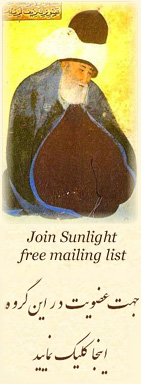Today, Sunlight offers Ghazal (Ode) 809, in a version by Coleman
Barks, and in translation by A.J. Arberry:
^ ^ ^ ^ ^
Steam fills the bath and frozen figures on the wall
open their eyes, wet and round, Narcissus eyes
that see enormous distances. And new ears
that love the details of any story. The figures dance
like friends diving into red wine, coming up and diving again.
Steam spills into the courtyard. It's the noise
of resurrection. They move from one corner
laughing across to the opposite corner. No one notices
how the steam opens the rose of each mind,
fills every beggar's cup solid with coins.
Hold out a basket. It fills up so well
that emptiness becomes what you want.
The judge and the accused forget the sentencing.
Someone stands up to speak, and the wood of the table
becomes holy. The tavern in that second is actually "made"
of wine. The dead drink it in.
Then the steam
evaporates.
The figures sink back into the wall, eyes blank,
ears just lines.
Now it's happening again,
outside.
The garden fills with bird and leaf sounds.
We stand in the wake of this chattering and grow airy.
How can anyone say what happens, even if each of us
dips a pen a hundred million times into ink?
-- Version by Coleman Barks
(based on A.J. Arberry's translation)
"These Branching Moments"
Copper Beech Press, 1988
~ ~ ~ ~ ~ ~ ~ ~ ~ ~ ~ ~ ~ ~ ~ ~ ~
Amazing keeper of the hot baths!* When he comes forth from
seclusion, every painted figure of the baths falls into prostration!
The figures, frozen, unconscious, dead - from the reflection of
his eyes their eyes open large as narcissi.
Through his ears their ears become familiar with fables,
through his eyes their eyes become receptive of vistas.
You behold every single bath-figure drunk and dancing, like a
boon companion who from time to time plunges in red wine.
The courtyard of the baths is full of their clamour and shout-
ing; the riotous clamour marks the first day of resurrection.
The figures call one another unto themselves; one figure from
that corner there comes laughing to another figure.
But no form discovers the bath-keeper himself, for all that
form is running hither and thither in search of him.
All are distracted, he behind and before them, unrecognized,
the king of the souls comes at the head of the army.
The rosebed of every mind is filled with roses from his cheeks;
the skirt of every beggar is filled with gold from his hand.
Hold your basket before him, that he may fill it of himself, so
that the basket of your poverty may become the despair of
Sanjar.*
Judge and plaintiff alike flee from less and more, when that
moon for one moment enters drunk into the assembly.
The wine becomes the tavern, the dead become riotous drunk,
the wood becomes the Moaning Pillar* when he enters the pulpit.
He denies them his presence, and their forms freeze, their eyes
vanish, their ears become deaf.
When he appears again their eyes open, the garden becomes
full of birds, the orchard is verdant.
Go to the rosebed and the garden, behold the friends and the
chatter;* in the wake of the _expression the soul comes to that
pass.
How can one tell what was manifested, friend? How can the
pen indite that, for all that it enters the inkholder?
-- Translation by A. J. Arberry
"Mystical Poems of Rumi 1"
The University of Chicago Press, 1968
*"hot baths": for comparison of the world to a bath stove, see
Math. IV:238-56
*Sanjar the Saluq ruler typifies kingship.
*The Moaning Pillar: the palm-trunk in the Prophet's mosque at
Medina which moaned when the Prophet grasped it.
*"The chatter": the meaning of "dastan" is ambiguous, and the
whole verse obscure.
The media:
http://tinyurl.com/khhm9


"Riotous Clamour"

































